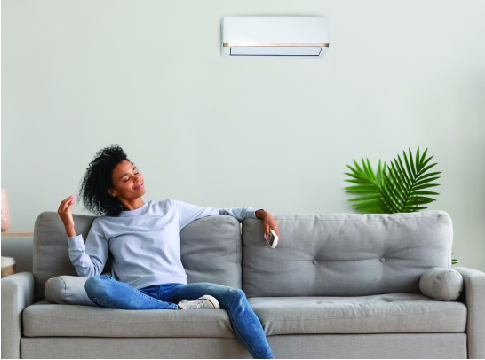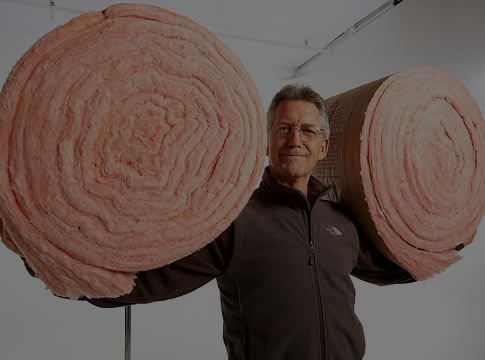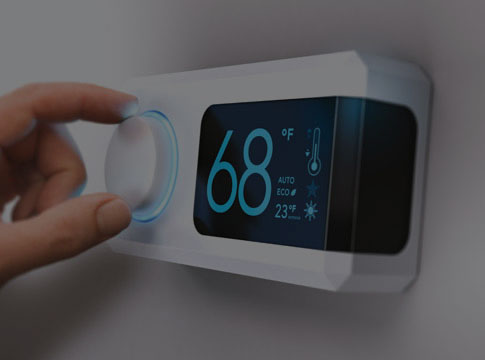Questions?
Email our energy experts at ems.answers@eweb.org or call 541-685-7088 for more information and to get started.
For all loan specific questions, email ems.loans@eweb.org or call 541-685-7318.
Want hot water at a lower cost?
A heat pump water heater uses heat pump technology to move heat from one place to another instead of generating heat directly. This makes them two to three times more efficient than conventional electric resistance water heaters. A super-efficient heat pump water heater may reduce energy waste and hot water costs by 50 percent or more.
All EWEB electric customers may be eligible for a rebate to install a new heat pump water heater.
Things to consider when installing a heat pump water heater
Heat pump water heaters can be installed in a variety of locations, including a garage, utility room or basement. Systems where the heat pump is integrated or stacked on top of the water tank are most common, but split systems are also an option. Please consider the following when determining whether an integrated heat pump water heater is right for you:
- Sound. Heat pump water heaters generate sounds similar to the background noise from a portable fan (around 45 decibels).
- Cool air. While in operation, heat pump water heaters release cool, dry air into the surrounding space. Ducting can be used to exhaust the air to the outside.
- Space. Heat pump water heaters typically need around 1,000 cubic feet (10'x10'x10') of airflow around them to operate properly. Some manufacturers may require less airflow and units can be installed in smaller areas if ducting or other airflow strategies are used.
- Size/height. Heat pump water heaters may be slightly larger than standard water heaters (60 inches tall or more). Also, some units may be required by the manufacturer to have additional top clearance.
- Condensate. Heat pump water heaters can release condensate. It is important to drain any condensate via a sloped drainage system, a condensate pump, or connection to a plumbing drain.
Click here for tips for do-it-yourself installations or to learn more on how heat pump water heaters are installed.

Online purchase promotion
To help you upgrade to an energy-efficient heat pump water heater, EWEB is working with General Pacific Inc., to directly apply our existing $900 rebate plus additional incentives at the time of purchase. All EWEB residential electric customers can now purchase a Rheem or AO Smith heat pump water heater for as low as $640, a savings of more than $1000. A separate heat pump water heater rebate application is not needed.
*Income-qualifying customers, do not purchase through this promotion. Please see Income-based information below.
**Customers living in the 97408 zip code should call General Pacific directly to place an order due to technical issues in recognizing correct pricing. You can reach General Pacific to place an order at 503-907-2899
If you experience after-installation issues with your heat pump water heater purchased through this specific online promotion, please reach out to General Pacific as a first step to resolve this at 503-907-2899.
Visit General Pacific, Inc.'s online store to purchase your heat pump water heater and have it delivered directly to your door.
Visit online storeIn-store purchase promotion through Jerry's Home Improvement Center
To help you upgrade to an energy-efficient heat pump water heater, Through December 31, 2024, EWEB is working with Jerry’s Home Improvement Center to directly apply our existing $800 rebate at the time of purchase. This means that all EWEB residential electric customers can now purchase a Reliance heat pump water heater for as low as $899 at any Jerry’s Home Improvement Center location. A separate heat pump water heater rebate application is not needed.
*Income-qualifying customers, do not purchase through this promotion. Please see Income-based information below.
Only Tier 3 or Tier 4 heat pump water heater units qualify.
If you experience after-installation issues with your heat pump water heater purchased through this specific in-store promotion, please reach out to Jerry’s Home Improvement Center as a first step to resolve this.
Visit either Jerry’s Home Improvement Center location in Eugene or Springfield to purchase your heat pump water heater. You will be required to provide your address and have EWEB electric service to qualify; EWEB water service-only accounts do not qualify.

We offer these rebates or loans
Heat pump water heater must be Tier 3 or Tier 4.
Standard rebates and loans:
- $900 rebate per heat pump water heater, or
- Up to a $2500 zero-percent interest loan
- Loans and rebates cannot be combined
- Loan terms: 48 month term.
- EWEB requires ALL homeowners be loan applicants. Missing home owner applications will delay your loan application process.
Income-based rebates and loans:
- Owner-occupied rebate $1,700
- Rental rebate $1,000
- Up to a $2500 zero-percent interest loan
- Loan is available in addition to rebate for costs above rebate amount
- Loan terms: 48 month term.
- EWEB requires ALL homeowners be loan applicants. Missing home owner applications will delay your loan application process.
- Please see income-based qualifications here.
Some energy efficiency upgrades may be eligible for federal tax credits in addition to rebates provided by EWEB. Additional information can be found on the Energy Star website.
For questions on how or if any tax credits may apply to you, please refer to a licensed tax professional.
Program eligibility
- Heat pump water heater must be Tier 3 or Tier 4.
- All EWEB customers may be eligible.
- The participant's signature on the residential application is required. The participant must be the EWEB account holder (or authorized on the account), owner or owner's representative.
- A maximum of one heat pump water heater rebate per home.
- To be eligible for higher income-based incentives, new heat pump water heater may only replace an existing electric water heater.
Get started!
Step One:
Apply online here. Once we receive and process your application we will send you a confirmation email. If you are also applying for a loan, select 'Yes' for "Do you wish to apply for an EWEB loan?" in the application and you will be guided through the required questions. You do not need to submit an application if you are participating in the special heat pump water heater online purchase promotion.
- If this is a rental home, please print and sign a W9 and mail to our office.
- If you prefer to mail in a paper project application, you can print one here.
- If you prefer to mail in a paper loan application, you can print one here (loan applications must be accompanied by a program application).
- Paper applications can be dropped off or mailed to:
EWEB Customer Solutions
4200 Roosevelt Blvd
Eugene, OR 97402
Applications can be emailed to ems.answers@eweb.org
Step Two:
Select a heat pump water heater from the BPA Qualified Heat Pump Water Heater list and get it installed. The heat pump water heater must be Tier 3 or Tier 4.
- "Do-it-yourself" installations qualify for our rebates, but if you would rather have a contractor install the unit, check out Hot Water Solutions' list of contractors.
- EWEB recommends, but does not require that participants acquire multiple bids.
- For "do-it-yourself" conversions from gas appliances to electric appliances, please check with your natural gas provider for any safety guidelines that you may be required to follow. It is always recommended that a licensed professional perform all installation work according to local codes.
- The heat pump water heater can be installed in an unheated location (e.g. garage, unheated basement, shed, etc.) or in a conditioned/interior location, and it must be installed according to the manufacturer specifications.
You will also need to submit the following:
- A copy of the purchase receipt and/or installer's invoice.
- The location (heated or unheated space) of the installed heat pump water heater.
After installation of the system and submittal of all required documentation, EWEB may verify the system for program compliance. The rebate payment will be mailed to either the participant or the contractor approximately four to six weeks from the date EWEB approves the installation. Loan payments will be mailed approximately four to six weeks after the homeowner returns the signed loan contracts to EWEB.
Check out more ways to save
High-efficiency heat pumps are ideal for our mild Pacific Northwest climate.
An energy efficient ductless heat pump is cheaper to install and operate than any other heating system.
Saving money on your energy bill may be easier than you think. Check out tips that could deliver real savings.






